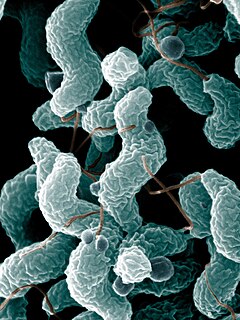Related Research Articles

In bacteriology, gram-positive bacteria are bacteria that give a positive result in the Gram stain test, which is traditionally used to quickly classify bacteria into two broad categories according to their type of cell wall.

Proteobacteria is a major phylum of Gram-negative bacteria. They include a wide variety of pathogenic genera, such as Escherichia, Salmonella, Vibrio, Helicobacter, Yersinia, Legionellales, and many others. Others are free-living (nonparasitic) and include many of the bacteria responsible for nitrogen fixation.

The Rhizobiaceae is a family of proteobacteria comprising multiple subgroups that enhance and hinder plant development. Some bacteria found in the family are used for plant nutrition and collectively make up the rhizobia. Other bacteria such as Agrobacterium tumefaciens and A. rhizogenes severely alter the development of plants in their ability to induce crown galls or hairy roots found on the stem. The family has been of an interest to scientists for centuries in their ability to associate with plants and modify plant development. The Rhizobiaceae are, like all Proteobacteria, Gram-negative. They are aerobic, and the cells are usually rod-shaped. Many species of the Rhizobiaceae are diazotrophs which are able to fix nitrogen and are symbiotic with plant roots.
Parvularcula bermudensis is a marine bacterium which was identified in 2003 in the western Sargasso Sea in the Atlantic Ocean. It forms a deep branch in the Alpha Proteobacteria, distinct from the other orders.
The Aurantimonadaceae are a small family of marine bacteria. Six species are known. Aurantimonas coralicida causes a white plague in corals. Fulvimarina pelagi was isolated from seawater, and takes the form of nonmotile rods.
The Acidithiobacillales are an order of bacteria within the class Acidithiobacillia and comprises the genera Acidithiobacillus and Thermithiobacillus. Originally, both were included in the genus Thiobacillus, but they are not related to the type species, which belongs to the Betaproteobacteria.

Epsilonproteobacteria are a class of Proteobacteria. All species of this class are, like all Proteobacteria, Gram-negative.
Mycobacterium bolletii is a bacterial species of the phylum Actinobacteria and the genus Mycobacterium. It was named in honor of Claude Bollet, a famous clinical microbiologist and taxonomist.
The order Sphingobacteriales comprises four families of environmental bacteria.
The International Journal of Systematic and Evolutionary Microbiology is a peer-reviewed scientific journal covering research in the field of microbial systematics that was established in 1951. Its scope covers the taxonomy, nomenclature, identification, characterisation, culture preservation, phylogeny, evolution, and biodiversity of all microorganisms, including prokaryotes, yeasts and yeast-like organisms, protozoa and algae. The journal is currently published monthly by the Microbiology Society.
The Chloroflexi or Chlorobacteria are a phylum of bacteria containing isolates with a diversity of phenotypes, including members that are aerobic thermophiles, which use oxygen and grow well in high temperatures; anoxygenic phototrophs, which use light for photosynthesis ; and anaerobic halorespirers, which uses halogenated organics as electron acceptors.
Caldisericum exile is a species of bacteria sufficiently distinct from other bacteria to be placed in its own family, order, class and phylum. It is the first member of the thermophilic candidate phylum OP5 to be cultured and described.
Virgibacillus is a genus of Gram-positive, rod-shaped (bacillus) bacteria and a member of the phylum Firmicutes. Virgibacillus species can be obligate aerobes, or facultative anaerobes and catalase enzyme positive. Under stressful environmental conditions, the bacteria can produce oval or ellipsoidal endospores in terminal, or sometimes subterminal, swollen sporangia. The genus was recently reclassified from the genus Bacillus in 1998 following an analysis of the species V. pantothenticus. Subsequently, a number of new species have been discovered or reclassified as Virgibacillus species.
Aureimonas frigidaquae is a Gram-negative, catalase- and oxidase-positive, facultatively anaerobic bacteria from the genus of Aurantimonas which was isolated from a water-cooling system in Gwangyang in the Republic of Korea. Aurantimonas frigidaquae was reclassified to Aureimonas frigidaquae.
Aureimonas ureilytica is a bacterium from the genus of Aurantimonas. Aurantimonas ureilytica was reclassified to Aureimonas ureilytica.
Fulvimarina pelagi is a Gram-negative, strictly aerobic, non-motile bacteria from the genus of Fulvimarina which was isolated from sea water from the western Sargasso Sea.
The Natranaerobiales are an order of bacteria placed within the class Clostridia. This order contains the thermophilic bacterial species Natranaerobius thermophilus and the related species Natranaerobaculum magadiense.
The order Holophagales (Ho.lo.pha.ga′les) is a Gram negative marine bacterium in the phylum Acidobacteria, class Holophagae. This order consists of a single family, Holophagaceae, which contains two genera, Holophaga and Geothrix. Each of these genera contains a single species and they are strict anaerobes.
The Orbales are an order of Proteobacteria with the single family Orbaceae. This order was created to accommodate novel bacterial species isolated from the guts of honeybees and bumblebees.
Fulvimarina manganoxydans is a Gram-negative and aerobic from the genus of Fulvimarina which has been isolated from a Hydrothermal vent from the Indian Ocean.
References
- 1 2 3 4 5 LSPN lpsn.dsmz.de
- ↑ UniProt
- ↑ Cho, J. -C. (2003). "Fulvimarina pelagi gen. nov., sp. nov., a marine bacterium that forms a deep evolutionary lineage of descent in the order 'Rhizobiales'". International Journal of Systematic and Evolutionary Microbiology. 53 (6): 1853–1859. doi: 10.1099/ijs.0.02644-0 . PMID 14657114.
| This Rhizobiales article is a stub. You can help Wikipedia by expanding it. |